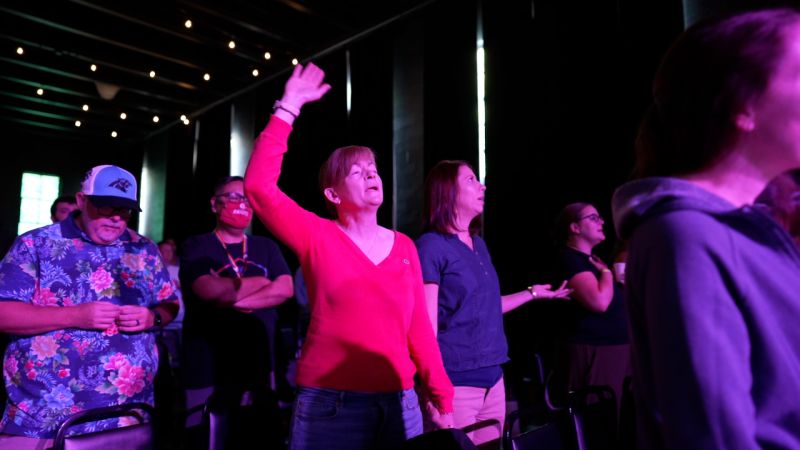Larissa Miller spent her early years immersed in evangelical communities, attending evangelical high school and college, and working for Billy Graham’s association for over 16 years. But as she reached her late 30s, she struggled with reconciling her sexuality with the conservative religious community she had been a part of for most of her life. In 2021, Miller left her job, came out as a lesbian, and married her wife, finding a welcoming community at Charlotte’s Watershed Church, which embraces both her spirituality and sexuality without conflict, a part of the growing post-evangelical movement.
The post-evangelical movement, which predates former President Donald Trump’s rise, has been accelerated by his alliance with White conservative evangelical leaders. These communities focus on inclusivity, LGBTQ rights, and social justice, marking a departure from mainstream conservative evangelical views. While White evangelicals have largely supported Trump and the Republican Party, post-evangelicals are more aligned with Democratic beliefs. However, the movement is not about promoting a specific political party but rather focuses on decoupling partisan and spiritual identities, providing welcoming spaces for individuals to explore their faith and beliefs.
The dominant image of evangelical Christians has shifted in recent years to primarily align with White conservatives who vote Republican and hold traditional views on marriage, abortion, and support Trump. Despite this, the White evangelical voting bloc is shrinking as younger generations hold different perspectives on key social issues, leading to a decline in White evangelicalism. The shift is also attributed to Trump’s embrace of the evangelical community and his alignment with their beliefs, which has led some individuals to seek alternative faith communities that align with their evolving beliefs.
Watershed Church in Charlotte is one such post-evangelical community that provides a welcoming space for those grappling with their beliefs and politics. The church challenges traditional evangelical teachings, emphasizes inclusivity, and provides a supportive environment for individuals to explore and question their faith. While the church addresses political topics, it also urges individuals to not tie their spiritual identity to any specific political party, fostering an environment where people can grow and learn without judgment or pressure.
Trump has maintained strong support among White evangelicals despite criticism of his personal conduct and evolving stances on certain issues. While his alliance with conservative evangelical leaders remains strong, there are efforts from both liberals and post-evangelical groups to engage with White evangelicals and Catholics who may be open to changing their voting patterns. Organizations like Evangelicals for Harris and Vote Common Good are working to encourage individuals to reconsider their voting habits and explore different political perspectives while encouraging them to stay engaged in the democratic process without idealizing a particular candidate or party.
The shift towards post-evangelical faith communities reflects a broader trend of individuals exploring different religious and spiritual beliefs that align with their evolving values. For individuals like Larissa Miller, the journey towards self-acceptance and acceptance within a new faith community is a process of self-discovery and finding a space where spirituality and personal identity can coexist harmoniously. As the post-evangelical movement continues to grow and expand, it offers an alternative to those seeking a more inclusive and progressive approach to Christianity, separating faith from partisanship and fostering a diverse and accepting community for individuals seeking spiritual growth and connection.


